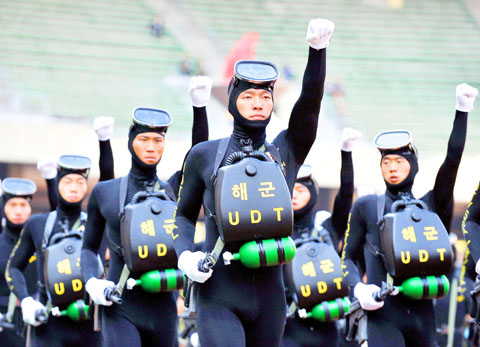A North Korean patrol vessel is suspected of firing last weekend on a Chinese fishing boat plying the waters off the west coast of the Korean Peninsula, wounding the ship’s captain, the South Korean coast guard said yesterday.
The incident occurred on Saturday in disputed waters, Coast Guard spokesman Park Sung-kook said by telephone from the South Korean port city of Incheon. The captain was hospitalized, but his injuries were not life-threatening, he said.
China is a key ally of communist North Korea and is the impoverished country’s main donor of aid and goods. Still, North Korean patrol boats have fired on both Chinese and South Korean ships in the past, though the incidents rarely result in injury.

PHOTO: AFP
The two Koreas, still technically at war, have a long history of disputes over their shared waters. The coastal tensions escalated into bloody naval skirmishes in 1999 and 2002.
The incident comes as the two Koreas negotiate over when to hold military talks — their first official talks since South Korea’s new conservative, pro-US government took office seven months ago — amid heightened concerns over Pyongyang’s push to reassemble its nuclear program.
The captain of the Chinese boat was struck by shrapnel from a shell believed fired from the North Korean vessel, another South Korean Coast Guard official said yesterday.
“What’s clear is that we didn’t open fire,” the official said.
He asked not to be named, citing department policy.
A Chinese embassy official in Seoul said he had no immediate comment yesterday.
The number of Chinese boats illegally fishing in South Korean waters has risen in recent years because of pollution and overfishing off China’s coast, the coast guard said.
South Korea and China signed a fisheries treaty that took effect in 2001, but more than 2,600 Chinese boats have been captured for fishing illegally in Korean waters since then, coast guard officials said.

Drug lord Jose Adolfo Macias Villamar, alias “Fito,” was Ecuador’s most-wanted fugitive before his arrest on Wednesday, more than a year after he escaped prison from where he commanded the country’s leading criminal gang. The former taxi driver turned crime boss became the prime target of law enforcement early last year after escaping from a prison in the southwestern port of Guayaquil. Ecuadoran President Daniel Noboa’s government released “wanted” posters with images of his face and offered US$1 million for information leading to his capture. In a country plagued by crime, members of Fito’s gang, Los Choneros, have responded with violence, using car

The team behind the long-awaited Vera Rubin Observatory in Chile yesterday published their first images, revealing breathtaking views of star-forming regions as well as distant galaxies. More than two decades in the making, the giant US-funded telescope sits perched at the summit of Cerro Pachon in central Chile, where dark skies and dry air provide ideal conditions for observing the cosmos. One of the debut images is a composite of 678 exposures taken over just seven hours, capturing the Trifid Nebula and the Lagoon Nebula — both several thousand light-years from Earth — glowing in vivid pinks against orange-red backdrops. The new image

CYBERCRIME, TRAFFICKING: A ‘pattern of state failures’ allowed the billion-dollar industry to flourish, including failures to investigate human rights abuses, it said Human rights group Amnesty International yesterday accused Cambodia’s government of “deliberately ignoring” abuses by cybercrime gangs that have trafficked people from across the world, including children, into slavery at brutal scam compounds. The London-based group said in a report that it had identified 53 scam centers and dozens more suspected sites across the country, including in the Southeast Asian nation’s capital, Phnom Penh. The prison-like compounds were ringed by high fences with razor wire, guarded by armed men and staffed by trafficking victims forced to defraud people across the globe, with those inside subjected to punishments including shocks from electric batons, confinement

Canada and the EU on Monday signed a defense and security pact as the transatlantic partners seek to better confront Russia, with worries over Washington’s reliability under US President Donald Trump. The deal was announced after a summit in Brussels between Canadian Prime Minister Mark Carney and European Commission President Ursula von der Leyen and European Council President Antonio Costa. “While NATO remains the cornerstone of our collective defense, this partnership will allow us to strengthen our preparedness ... to invest more and to invest smarter,” Costa told a news conference. “It opens new opportunities for companies on both sides of the